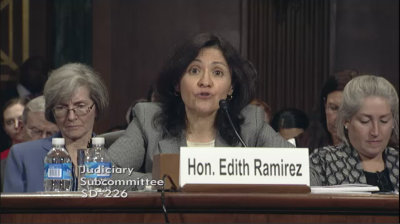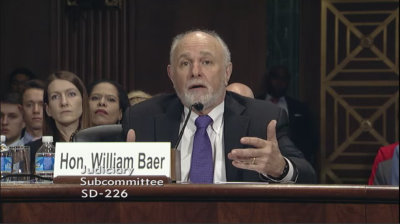On the afternoon of Wednesday, March 9th, the antitrust subcommittee of the U.S. Senate Committee on the Judiciary convened for a hearing entitled Oversight of the Enforcement of Antitrust Laws. The day’s proceedings brought together the heads of America’s two lead agencies in addressing issues of anticompetitiveness affecting U.S. consumers: William Baer, assistant attorney general for the antitrust division of the U.S. Department of Justice (DoJ); and Edith Ramirez, chairwoman of the Federal Trade Commission (FTC).
The day’s hearing focused mainly on the effectiveness of both the FTC as well as the DOJ’s antitrust division in serving American consumers through the enforcement of antitrust laws. In his opening remarks, Senator Mike Lee (R-UT) noted that this was the first hearing of its kind to examine the effectiveness of antitrust law enforcement in three years. Lee noted that the current moment was a good time to review the effectiveness of such legislation in the wake of what he called a “drastic increase” in mergers of a significant size, including the AT&T/DirecTV merger and the AB InBev/SABMiller merger in the beer industry. Senator Amy Klobuchar (D-MN) followed with remarks stating that in 2015, the DOJ’s antitrust division collected a total of $3.6 billion in criminal fines. She also spoke to recent increases in prescription drug prices and how alleged “pay for delay” schemes in the pharma industry has proven costly to the American prescription drug consumer.
I may be of particular interest to our readers to note that there was very little talk during the hearing about patents, although antitrust law has a way of naturally bumping up against the exclusive rights afforded to inventors by the issue of a patent. When patents were brought up in the hearing, however, it seemed to focus mainly on their effects in the pharmaceutical world. Ramirez’s prepared remarks for the hearing touched on pay for delay in pharmaceutical patent infringement settlements, and she noted that the U.S. Supreme Court’s June 2013 decision in Federal Trade Commission v. Actavis has given the FTC a greater capacity to challenge pay for delay schemes in court. Notes in her testimony also found that the number of reverse-payments filed with the commission has steadily dropped since 2013 as the overall number of patent settlements has increased.
Ramirez also commented on the ongoing study underway at the FTC to look into the business model employed by patent assertion entities (PAEs), companies whose primary business activity is licensing patents and litigating against alleged infringement. During questioning, Ramirez said that the FTC report on patent assertion entities will be made available sometime this spring.
The only piece of legislation related to patents brought up at the Senate judiciary committee hearing was the PATENT Act, which Klobuchar noted she was co-sponsoring along with fellow subcommittee members Lee, Senator Chuck Grassley (R-IA) and Senator Orrin Hatch (R-UT).
In response to Lee’s assertion that we were seeing an increase in mergers among major companies, Baer called it a “tsunami,” noting that in the past couple of years the country has seen a 200 percent increase in the number of such deals valued at $1 billion or greater. Lee later followed with the fact that in 2015 alone, there was a total of $2 trillion in deal value involving corporate mergers. Baer noted that much of this increase could be attributable to many companies being conservative with their cash resources during the Great Recession but are finding more reasons to invest in business moves today. “I don’t think that the percentage of problematic deals has gone up,” Baer said, “but because the sheer volume has gone up, that means our volume of work has gone up in terms of sheer numbers by a large amount.”
In light of the Great Recession and the issue of “too big to fail” which had prompted stimulus bailouts for the financial sector, it was interesting to note the focus by regulatory officials on whether or not mergers were “too big to fix,” a phrase first mentioned at the hearing by Baer. The notion of “too big to fix” was a major reason why antitrust regulators threw up roadblocks to the attempted $45 billion acquisition of Time Warner Inc (NYSE:TWX) by Comcast Corporation (NASDAQ:CMCSA), an effort the latter organization dropped in April 2015 after rising scrutiny from regulators at the DoJ and the Federal Communications Commission.
It’s clear that the antitrust subcommittee members in attendance were concerned not only by the large dollar amounts behind recent proposed mergers but the vast range of industries in which these major deals were being seen. Grassley noted Chinese agrochemical firm ChemChina’s proposed $43 billion takeover of Syngenta (NYSE:SYT), a move that could shift the landscape of America’s food distribution chain. Klobuchar discussed what she saw as a suspicious business move in the railroad industry where a multi-billion dollar offer by Canadian Pacific (NYSE:CP) to buy Norfolk Southern (NYSE:NSC). Baer described the deal, which is structured to install Canadian Pacific CEO Hunter Harrison as the CEO of Norfolk Southern while the deal is under regulatory review, as “letting the fox into the chicken coop before an investigation later as to why there are so many feathers lying around.” A letter submitted to the antitrust subcommittee by Senator Patrick Leahy (D-VT), ranking member of the Senate judiciary committee, mentioned The Wall Street Journal had reported that one-third of American industries, businesses operate in a highly concentrated environment, raising concerns over competition and consumer choice in those industries.
Senator Dick Durbin (D-IL) is not a member of the Senate’s antitrust subcommittee but he attended the hearing to discuss a couple of anticompetitive business practices which had him concerned. He also discussed issues in the pharmaceutical industry, specifically instances of alleged price gouging such as the 5,000 percent price increase for Daraprim after its rights were purchased by Turing Pharmaceuticals. For-profit universities and swipe fees charged to merchants by “megabanks” were also targeted by Durbin. In each case, Baer and Ramirez said that their agencies would remain vigilant for abuses, although Ramirez did indicate that current antitrust law didn’t give regulatory agencies much opportunity to investigate consolidation within the pharmaceutical industry.
Despite these concerns raised, both Baer and Ramirez felt confident about the ability of current U.S. antitrust law to respond to new challenges. “My view is that [current] antitrust laws are sufficiently flexible to adapt,” Ramirez said. During questioning, Baer mentioned that the laws do not currently give the DOJ much authority in addressing issues involving common ownership; Senator Richard Blumenthal (D-CT) had previously noted the potential for collusion in the airline industry, where four airlines control 80 percent of the market and each have common major shareholders. Baer called this kind of common ownership “classic oligarchy theory in a new environment.”
Elsewhere, Baer noted that the DoJ’s budget request for the 2017 fiscal year included a modest increase in funding which he hoped Congress would look favorably upon. Ramirez said that, while the FTC was generally well-equipped to handle problems, there was a wish list which includes the elimination of the exemptions for common carriers and nonprofits.

![[IPWatchdog Logo]](https://ipwatchdog.com/wp-content/themes/IPWatchdog%20-%202023/assets/images/temp/logo-small@2x.png)



![[Advertisement]](https://ipwatchdog.com/wp-content/uploads/2024/04/Patent-Litigation-Masters-2024-sidebar-early-bird-ends-Apr-21-last-chance-700x500-1.jpg)

![[Advertisement]](https://ipwatchdog.com/wp-content/uploads/2021/12/WEBINAR-336-x-280-px.png)
![[Advertisement]](https://ipwatchdog.com/wp-content/uploads/2021/12/2021-Patent-Practice-on-Demand-recorded-Feb-2021-336-x-280.jpg)
![[Advertisement]](https://ipwatchdog.com/wp-content/uploads/2021/12/Ad-4-The-Invent-Patent-System™.png)







Join the Discussion
5 comments so far.
Anon
March 15, 2016 09:31 pmI wonder if this will end up to be timed to the White House response to Ron Katznelson….
(Happy anniversary, Ron)
Xtian
March 15, 2016 03:56 pmI just hope the FTC includes Universities in their NPE calculations. Biggest offender in the pharma space by far….
valuationguy
March 15, 2016 02:37 pmAgreed that most anything that comes out of the FTC is going to be anti-patent oriented.
I am looking forward to the FTC’s draft just to see how bad they try to paint NPE’s/PAE’s. The statistics have already peaked regarding how big (small actually) the PAE problem was (new federal filing requirements and increased instances of judicial awarding fees for abusive conduct are already putting the heavy brakes on…) such that delaying any report further would be counterproductive to the FTC’s cause.
Valuationguy
Night Writer
March 13, 2016 02:43 pmI believe that the FTC has already shown a bias against patents, so this is likely not going to be good. The OMB should do another report. They tend to be above the massive slush funds that buy off these reports.
Anon
March 13, 2016 12:06 pmThere is an (obvious?) reference missing from this article: Citizen United and the power that accompanies that “voice” from larger (and larger) corporations simply outsizes (outspends) any other voice of the people.
The dystopia of “Corporatism” is a meme in movies and science fiction for a reason.